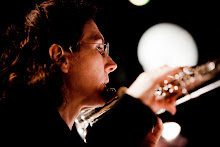Her class on piccolo playing was full of these great ideas. Her experience with Feldenkreis made things all the more intereting. The piccolo can be hard on the body!
- In general, try placing the piccolo higher on the lower lip than the flute, and keep it turned out.
- Tensing your shoulders is like jumping in water and hoping you'll swim! If you untense your shoulders, you will improve without having practiced.
- The key to playing piccolo in the top register: increase the air speed without blowing more. You can keep the air speed fast by: 1) making the embouchure hole smaller and 2)putting more pressure behind the embouchure.
- You don't need to practice hours and hours on the piccolo. Thoughtful, sensible transferrence of flute technique to piccolo every day regularly instead.
- Ascending crescendos: build sound up at bottom, then let it alone. High notes are naturally loud.
- For low notes, you need to be able to lift the top of the lip. It helps to use the inside of the top lip, instead of having the top lip always rammed down. Don't let bottom lip drop. To apply this to the low register: think of starting low notes from lifted upper lip.
- Practice Moyse Tone Development through Interpretation on the piccolo.

Her recommendations about taking the repeats in the Vivaldi Concerto at auditions:
You may ask if they want the repeats. If you are shy about asking, repeat the 1st section, then immediately play the ornamented version of the 2nd half.
I wish I could attend more of her classes! Years ago I bought her Piccolo Practice Book, but gave it away. Pretty silly, but I hope whoever has it is getting a lot of use.


Lots of valuable suggestions! It's always helpful to learn more about piccolo . . . thanks for the post!
ReplyDeleteThanks, I had the honor yesterday of meeting with Pat Morris in her home. We had a very interesting discussion about many things, esp. intonation and articulation. She talked of some of the typical problems of coming from flute playing: the tongue needs to be much lighter than on the flute. Also some players pinch the upper lip down too much, thinking that will make the embochure smaller and more focused. Well, it does make it smaller but not in the right way. Better to think of bringing the lips forward to make the hole smaller, but never by pressing down the upper lip. This pressing also doesn't help intonation. She mentioned that sometimes you need a "spread" sound to blend with a string section. If the sound is too focused and direct, it won't fit - either intonation or color.
ReplyDeleteAnother interesting thing she mentioned which suprised me: on a panel for the auditions for her former job she heard many fabulous piccolo players who could make wonderful soft dolce sounds. What she didn't hear was really good loud playing! I mentioned that that is also a problem I have in the middle and low register - you wouldn't think a piccolo would have problems being heard, but it is more common than you would think. She suspects it has to do with the make of piccolo (in my case at least). There seems to be a dynamic limit to Hammig piccolos for example. You don't hear this problem on Braun piccolos. Hmm, another thing to save for!
I was very pleased she was interested in my intonation exercises!